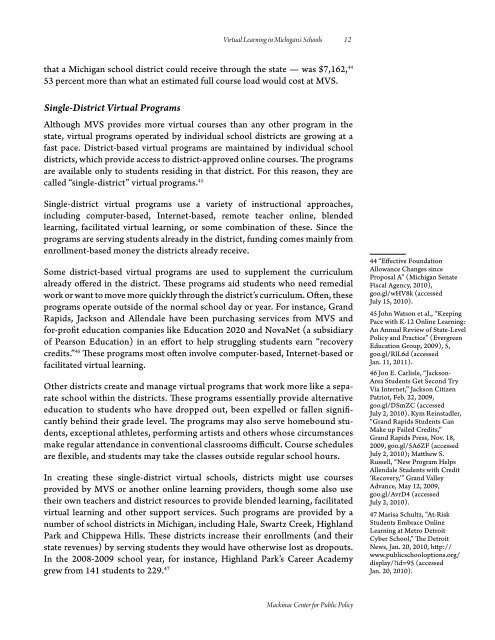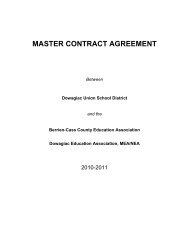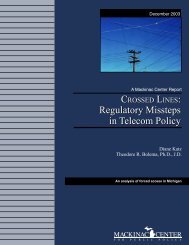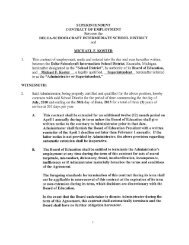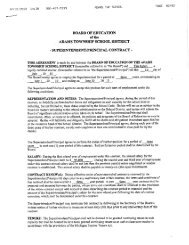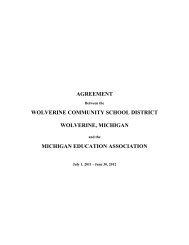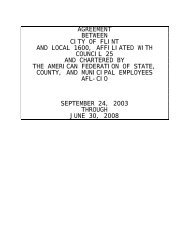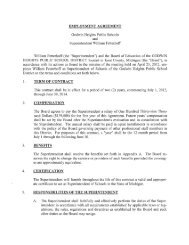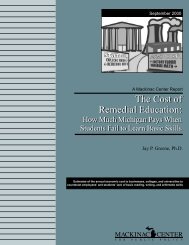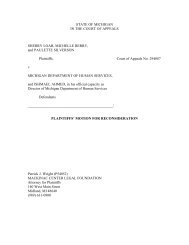by Michael Van Beek - Michigan Virtual University
by Michael Van Beek - Michigan Virtual University
by Michael Van Beek - Michigan Virtual University
You also want an ePaper? Increase the reach of your titles
YUMPU automatically turns print PDFs into web optimized ePapers that Google loves.
<strong>Virtual</strong> Learning in <strong>Michigan</strong>’s Schools 12that a <strong>Michigan</strong> school district could receive through the state — was $7,162, 4453 percent more than what an estimated full course load would cost at MVS.Single-District <strong>Virtual</strong> ProgramsAlthough MVS provides more virtual courses than any other program in thestate, virtual programs operated <strong>by</strong> individual school districts are growing at afast pace. District-based virtual programs are maintained <strong>by</strong> individual schooldistricts, which provide access to district-approved online courses. The programsare available only to students residing in that district. For this reason, they arecalled “single-district” virtual programs. 45Single-district virtual programs use a variety of instructional approaches,including computer-based, Internet-based, remote teacher online, blendedlearning, facilitated virtual learning, or some combination of these. Since theprograms are serving students already in the district, funding comes mainly fromenrollment-based money the districts already receive.Some district-based virtual programs are used to supplement the curriculumalready offered in the district. These programs aid students who need remedialwork or want to move more quickly through the district’s curriculum. Often, theseprograms operate outside of the normal school day or year. For instance, GrandRapids, Jackson and Allendale have been purchasing services from MVS andfor-profit education companies like Education 2020 and NovaNet (a subsidiaryof Pearson Education) in an effort to help struggling students earn “recoverycredits.” 46 These programs most often involve computer-based, Internet-based orfacilitated virtual learning.Other districts create and manage virtual programs that work more like a separateschool within the districts. These programs essentially provide alternativeeducation to students who have dropped out, been expelled or fallen significantlybehind their grade level. The programs may also serve homebound students,exceptional athletes, performing artists and others whose circumstancesmake regular attendance in conventional classrooms difficult. Course schedulesare flexible, and students may take the classes outside regular school hours.In creating these single-district virtual schools, districts might use coursesprovided <strong>by</strong> MVS or another online learning providers, though some also usetheir own teachers and district resources to provide blended learning, facilitatedvirtual learning and other support services. Such programs are provided <strong>by</strong> anumber of school districts in <strong>Michigan</strong>, including Hale, Swartz Creek, HighlandPark and Chippewa Hills. These districts increase their enrollments (and theirstate revenues) <strong>by</strong> serving students they would have otherwise lost as dropouts.In the 2008-2009 school year, for instance, Highland Park’s Career Academygrew from 141 students to 229. 4744 “Effective FoundationAllowance Changes sinceProposal A” (<strong>Michigan</strong> SenateFiscal Agency, 2010),goo.gl/wHV8k (accessedJuly 15, 2010).45 John Watson et al., “KeepingPace with K-12 Online Learning:An Annual Review of State-LevelPolicy and Practice” (EvergreenEducation Group, 2009), 5,goo.gl/RlL6d (accessedJan. 11, 2011).46 Jon E. Carlisle, “Jackson-Area Students Get Second TryVia Internet,” Jackson CitizenPatriot, Feb. 22, 2009,goo.gl/DSmZC (accessedJuly 2, 2010). Kym Reinstadler,“Grand Rapids Students CanMake up Failed Credits,”Grand Rapids Press, Nov. 18,2009, goo.gl/5A6ZF (accessedJuly 2, 2010); Matthew S.Russell, “New Program HelpsAllendale Students with Credit‘Recovery,’” Grand ValleyAdvance, May 12, 2009,goo.gl/AvrD4 (accessedJuly 2, 2010).47 Marisa Schultz, “At-RiskStudents Embrace OnlineLearning at Metro DetroitCyber School,” The DetroitNews, Jan. 20, 2010, http://www.publicschooloptions.org/display/?id=95 (accessedJan. 20, 2010).Mackinac Center for Public Policy


